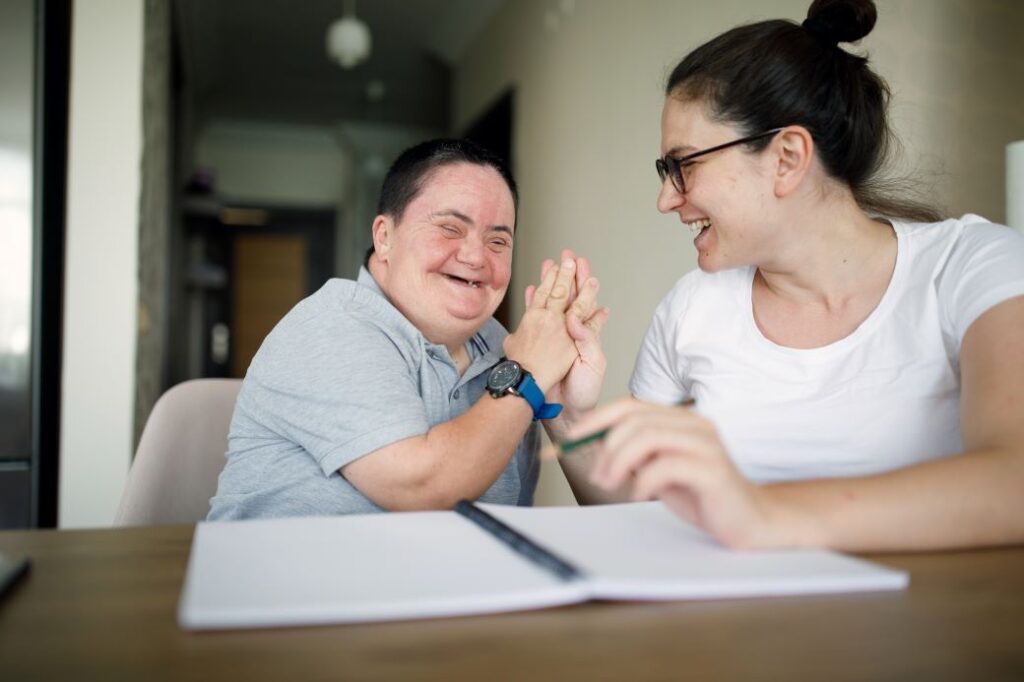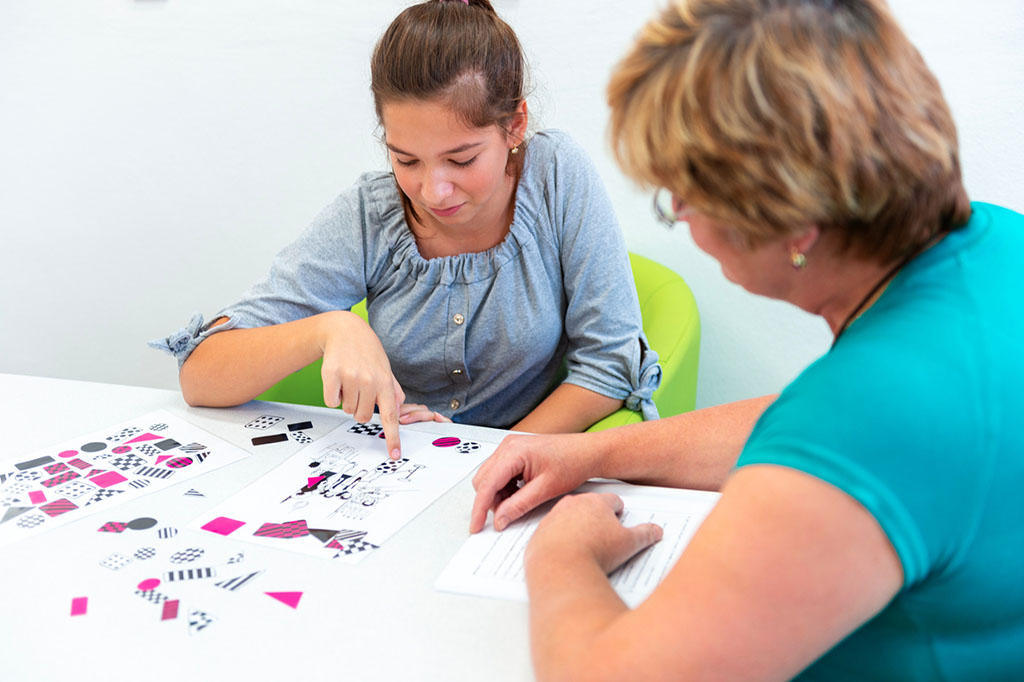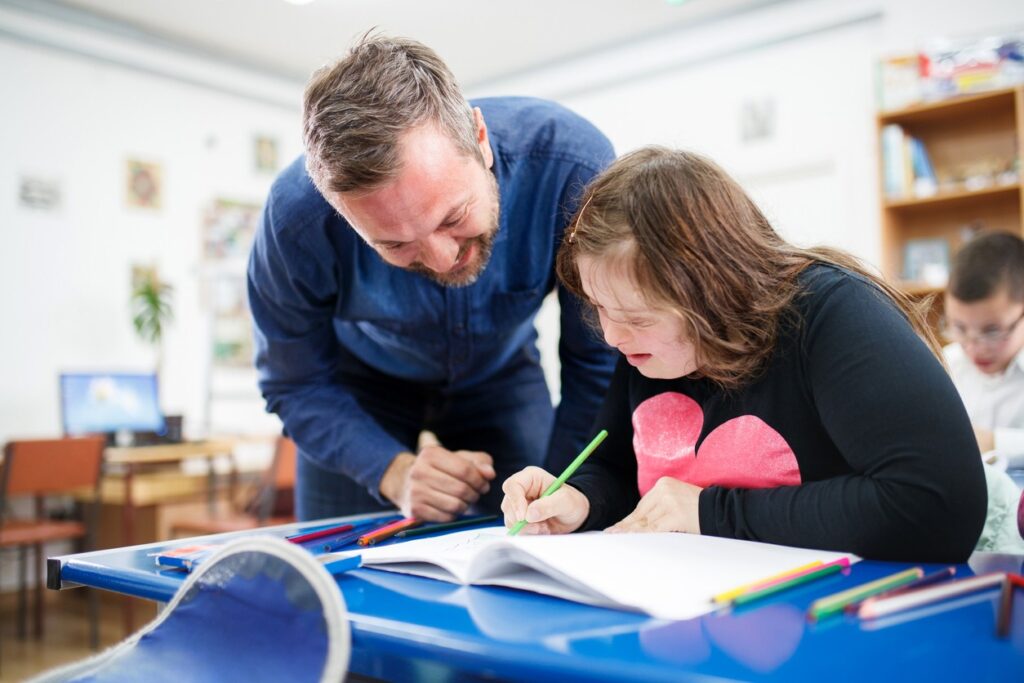What Is a Learning Disability?
Learning disability is an umbrella term for multiple neurodevelopmental conditions that affect a person’s ability to acquire new skills, learn complex information, and handle everyday tasks. Learning disabilities can vary significantly in severity and are therefore divided into mild, moderate, and severe.
Support from family members and support workers is vital for the individual’s physical and emotional progress.
Unlike learning difficulties (such as dyslexia and dyspraxia), learning disabilities affect several areas of a person’s cognitive and social functioning rather than just a specific form of learning. Children with a learning disability often have one or more learning difficulties that impact their school performance and social life.
The term learning disorder is no longer used and has been replaced with learning disability or intellectual disability.
Signs of Learning Disabilities
Many children can struggle with reading, writing, speech, and language acquisition at some point in their early school-age years. Experiencing one of these difficulties isn’t necessarily a sign of a learning disability.
Every person with learning disabilities can experience different symptoms. That being said, common signs of intellectual disabilities include the following:

- Language delay (speaking in short and simple phrases, skipping words in sentences)
- Difficulty grasping words and concepts, inability to pronounce words and express thoughts correctly
- Poor motor skills (trouble holding pencils or paintbrushes, using eating utensils, or tying shoelaces)
- Short attention span, struggling to stay focused throughout the school day
- Impulsive behaviour in social interactions
- Difficulty working in a group
- Impaired communication skills, struggling to interpret other people's feelings
- Distress over changes in schedules or routines
Our Impact - The Story of P.
P. is one of the individuals we support living with a learning disability, besides living with autism and multiple diagnoses.
Our support workers provide P. with the utmost care and empathy. They work seamlessly together, always keeping P.’s needs at the forefront of their humanised approach. They recognise the significance of understanding the needs and supporting the well–being of people with learning disabilities to lead more independent and enriched lives.
It’s always heartwarming to share the positive outcomes and the entire journey P. experiences with our provision of care.
Learning Disability Examples
Different types of learning disabilities can impact different parts of the brain and interfere with various areas of cognitive development.
For instance, some people with a learning disability experience challenges with the following:
- Learning skills, including reading, writing, and maths
- Time management
- Health and social wellbeing
- Focus
- Short and long-term memory
- Planning
- Abstract thought
Experts recognise the following types of learning disabilities that require specialist accommodation:
- Fragile X syndrome
- Turner syndrome
- SYNGAP1
- Non-verbal learning disabilities
- Down's syndrome
Learning Disabilities in Children
Children with learning disabilities usually require additional instructions and assistance from a specialist. In case of a suspected learning disability, the specialist can test the child’s intellectual abilities and decide whether expert intervention is needed. The child’s parents, educators, and healthcare providers should collaborate in finding adequate referrals and therapy.
Learning disabilities in children lead to difficulties in several areas of learning. Below are listed the most common symptoms of learning disabilities that parents and teachers should look out for:
- Difficulty perceiving directions (telling left from right)
- Struggling to complete tasks related to motor skills, such as writing, drawing, cutting, or eating with utensils
- Reversing numbers and difficulty spelling
- Poor balance and uncoordinated movements
- Struggling to grasp the concept of time
- Inability to memorise phrases that were just read or said
- Difficulty understanding shapes, sizes, and patterns
- Struggling to follow instructions and stay organised
Learning Disabilities in Adults
Symptoms of learning disabilities commonly appear during the individual’s early school-age years. However, some children’s developmental struggles are left unnoticed until they reach adolescence or higher education.
Individuals with undiagnosed learning disabilities often face challenges in their academic or work environment, which can result in low self-esteem and mental health issues.


Signs of a learning disability in adulthood:
- Difficulty reading and writing
- Forgetfulness, short-term or long-term memory issues
- Social withdrawal
- Struggling to stay focused for a longer time
- Struggling to follow conversations
- Difficulties with math
- Struggling to understand social norms
- Issues with problem-solving and critical thinking
What Causes a Learning Disability?
Learning disabilities are caused by factors that disrupt the brain’s development and functioning. The events and conditions leading to a learning disability can occur before the person’s birth, during birth, or in early childhood.
In some cases, the cause of a learning disability may remain unknown.
The most common causes of learning disabilities include:
- Genetic conditions (for example, fragile X syndrome)
- Chromosomal aberrations, such as Down's syndrome and Turner's syndrome
- Illness during pregnancy
- Complications during childbirth leading to a lack of oxygen in the brain
- Illness or injury (e.g. meningitis) in early childhood
Learning Disability Diagnosis
Getting diagnosed with a learning disability is a process that consists of several steps, including testing, history taking, and observing the individual’s behaviour.
Finding a credible referral is crucial for the child’s journey towards an independent life. The child’s school staff should be able to refer the family to a reputable team of specialists and health professionals.
You can receive a learning disability diagnosis from a coordinated team consisting of several specialists. The child’s teachers are often involved in the process as well. The following types of specialists are involved in the testing and diagnosis of learning disabilities:
- School psychologists
- Clinical psychologists
- Developmental psychologists
- Psychometrists
- GP
Difference Between Learning Disabilities and Learning Difficulties
There is a significant difference between learning disabilities and learning difficulties. Understanding the differences between learning difficulties and learning disabilities is vital for parents and carers to provide their children with adequate support.
Medical professionals distinguish learning disabilities from learning difficulties based on each category’s effect on the person’s development.
Learning difficulties are defined as differences that affect the individual’s skills in a specific area of learning but do not impact their overall intelligence level.
Examples of learning difficulties are:
Learning disabilities may impact people’s intelligence and disrupt their general learning skills. However, it’s vital to know that people with a learning disability can learn skills, they just need different methods and patience.
For example, Down’s syndrome is perceived as a learning disability because it affects all areas of the person’s life, including their ability to partake in everyday activities, social skills, and physical health.
As opposed to that, dyslexia is considered a learning difficulty because it exclusively affects one area of the person’s learning skills and doesn’t impair their other life skills. Dyslexia impacts reading, writing, and spelling skills but does not extend to other areas of learning.
What is a Learning Disability Nurse?
A learning disability nurse is responsible for maintaining the individual’s physical and mental health, helping them live independently, and supporting their integration into the local community.
These professionals assist people with learning disabilities, such as:
- Completing everyday tasks
- Medication management
- Aid with personal hygiene
- Organise activities in the community
- Maintaining relationships with family members and friends
- Learn skills
- Find employment
What are Learning Disability Services?
The goal of learning disability services is to establish a healthy environment for children and adults with learning disabilities so they can reach their full potential.
Access to tailored treatments allows people with complex learning and educational needs to improve their learning skills, boost their self-esteem, and become an active part of the local community. Support workers are here to create a nurturing environment where these individuals are encouraged to use their strengths productively and practice self-reliance.
Once your loved one receives a learning disability diagnosis, finding a reliable care service provider is the next step. Children, young people, and adults with learning disabilities require support from a team of specialists to overcome challenges and channel their unique strengths in a productive framework.
Below are listed the most common methods involved in the diagnosis and treatment of learning disabilities:
- Early childhood assessment
- Educational consultation
- Intensive learning treatment
- Intensive academic intervention
- Neuropsychological evaluation
- Speech and language therapy
- Occupational therapy
Will's Journey
Will is a 24-year-old man born with Down’s syndrome, and after being left without consistent support, he developed behaviours that challenged him as he grew older. His mother, Maurizia, lost the confidence to take Will out because she worried he would go into crisis.
“I could hardly stand up or look after myself, let alone Will, so a call was made by a family member to the social worker saying that I needed support. It was at this point that Leaf Complex Care was asked to provide the package of support for Will.” – says his mother, Maurizia.
Our team of clinicians outlined a Positive Behaviour Support Plan through a person-centred, humanised approach. With our PBS plan, Will didn’t show any of the behaviours that challenge, and there were no crises to be managed anymore. He is now active, goes to the gym and enjoys eating healthy food.
Learning Disability Services with Leaf Complex Care
At Leaf Complex Care, providing compassionate care services for individuals with learning disabilities is our lifelong mission. Our impact-driven support workers are dedicated to providing person-centred, tailored care for children and adults with learning disabilities in their own homes.
We aim to remove the social barriers imposed on individuals with learning disabilities and help them live independent, successful, and fulfilling lives. We carefully outline a care plan catering to the individual’s needs and preferences. We prioritise the person’s right to privacy, dignity, and bodily autonomy. Our dedicated support workers will care for the person’s hygiene, nutrition, medication management, and social integration. The Leaf home care team empowers individuals with learning disabilities and encourages them to complete tasks independently whenever possible.
We deliver CQC-regulated care services for individuals with learning disabilities across the UK, with our offices in Bristol, Slough, Somerset and the Midlands.
Contact us, and we will outline a care plan according to your needs.







